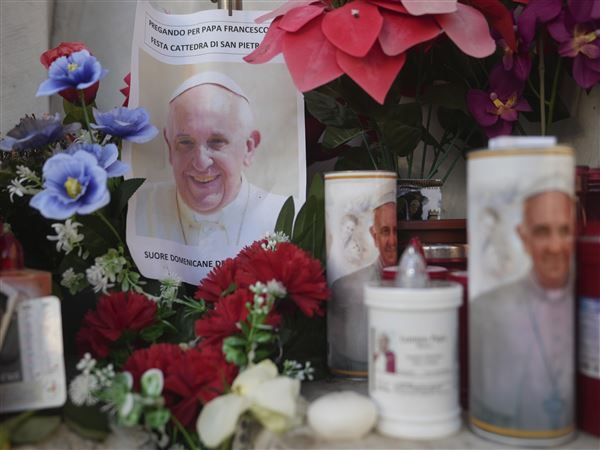This has been a tough year for the National Football League, with charges of domestic abuse and other crimes surfacing against top players. The accused include former Baltimore Ravens running back Ray Rice and Minnesota Vikings runner Adrian Peterson.
While these cases affect the players, their families, friends and teams, the impact also has seeped into the world of fantasy football and forced the “general managers” of fantasy teams to make ethical decisions about fielding troubled stars.
Because fantasy worlds are magical realms — alternate realities that can act as escapes from the aches and problems of the real world — participants naturally don’t welcome the infusion of real-world pain.
Fantasy football allows fans to act as managers of their own teams. Participants “draft” NFL players at the start of the season and field teams each week, winning or losing a game based on how well their players perform against their competitors’.
Fantasy football has given millions of participants temporary escape from all things worldly since the 1960s. That number is no fantasy. Forty-one million people in the United States and Canada alone play fantasy sports, according to the Fantasy Sports Trade Association.
This world, though, has been compromised.
According to the USA Today database of NFL athlete arrests, more than 80 players have been arrested on charges of domestic violence since 2000. Those include Pittsburgh Steelers linebacker James Harrison and fantasy football superstars, such as wide receivers Dez Bryant of the Dallas Cowboys and Brandon Marshall of the Chicago Bears.
Such off-field troubles have troubled more than a few fantasy footballers this season, forcing them to balance success as managers against their own ethics. Should they allow arrests or reports of domestic violence involving their players to interfere with their roster decisions?
In Rice’s case, managers had to wrestle with a decision during the fantasy season’s drafts, which primarily take place in August when the NFL preseason winds down and battles for starting roles largely have been determined.
On Sept. 8, Rice was released by the Ravens and suspended indefinitely by the NFL because of a violent altercation Feb. 15 with his then-fiancee in an Atlantic City casino.
Before Sept. 8, however, he faced only a two-game suspension — a period that would have been detrimental to his statistical production but not long enough to negate his fantasy relevance for the season. A top overall fantasy running back in 2011, he had a less productive year in 2012. After a disappointing 2013, he had become a lower-round pick this year, both because of his poor showing the previous year and the two-game suspension.
In such situations, fantasy football managers, like their real-life counterparts, must weigh morals and ethics against winning.
C.D. Carter, a fantasy football writer for TheFakeFootball.com and other websites, usually advocates choosing players based on performance and reasoning rather than emotion and intuition. In fact, in his 2013 book, “How to Think Like a Fantasy Football Winner,” Carter devotes a section, “The Problem of Empathy,” to how and why fantasy football players should allow logic to trump emotion and empathy.
“Eschewing empathy is counter to our natural reactions, especially in [fantasy] leagues with friends, family members, and coworkers, who — unlike the random droves we face off against in some leagues — have faces,” Carter wrote.
But recent events have altered his perspective.
“I [saw] some people on Twitter saying they [were] going to drop Ray Rice no matter what happens to him from a suspension or legal standpoint, and if I were to be 100 percent true to the things I wrote in the book, then I would say, ‘Well, that’s no good’ ... But if I were to acknowledge my human side, then I couldn’t say that,” Carter said in an interview.
Despite the chance to add a potentially key piece to his fantasy rosters, Carter sided with the empathetic fantasy managers. While his preferred, calculated approach is more optimal than the emotional manner in which many play the fantasy game, Carter could not take his own book’s advice about Rice.
“I won’t deny my humanity, even if it means sacrificing a valuable fantasy commodity,” Carter added. “Numbers and figures and money, after all, are the opposite of humanity, and sometimes we’re forced to choose between one or the other.”
Peterson, a consensus first-round pick in this year’s fantasy drafts, became the latest ethical dilemma for those who play the game. On Sept. 12, Peterson was indicted on a felony count of child abuse for whipping his 4-year-old son with a tree branch. He later pleaded no contest to a misdemeanor, avoiding jail time. Last week, the NFL suspended him for at least the rest of the season.
In his first seven NFL seasons, Peterson was an upper-echelon fantasy football running back. In three of those seasons, he was a top-two at his position, making him an historically anomalous player for his consistently elite fantasy football production.
Unlike Rice, whose best days may already have been behind him, Peterson showed continued potential to be one of the hottest commodities in the entire game. But Carter again let emotion weave its way into his fantasy football mindset.
“I’d have to ignore a basic violation of someone’s human rights if I were to benefit from one of the most consistent and reliable fantasy assets in the NFL,” Carter said after the charges were announced.
But this sentiment is not shared by all.
JJ Zachariason, editor-in-chief of numberFire.com, a sports analytics and fantasy sports website, said he had continued to roster Peterson on the chance that he would return to the field this year. In his view, the running back, who just two years ago rushed for 2,097 yards — only several yards shy of breaking Eric Dickerson’s all-time single-season record set in 1984 — was worth waiting for if ethics did not factor into the equation.
“The NFL product is awesome,” Zachariason, a 26-year-old Marshall native now living in Charlotte, N.C., said in an interview. Fantasy football, he said, “is a really engaging way to interact with that product.”
Zachariason said he has not allowed the recent domestic violence cases to change his approach.
“The general problem here is that we never know what goes on behind closed doors,” Zachariason said. “The same could be said for people you work with on a daily basis — you just don’t know.
“While there’s plenty of bad going on in the NFL on an individual level, there’s also plenty of good,” he added.
Zachariason is unapologetic. “To be truthful, I don’t view fantasy football as a real-life game,” he said. “It’s almost like a video game. It’s enjoyment.”
But he is not oblivious to the NFL’s recent problems and did have concerns about what he saw as the lenient punishment initially doled out to Rice.
“I thought it was far too short of a suspension, not only because what Ray Rice did was horrible, but because the NFL has so many people helping to make these decisions,” Zachariason said. “Meaning, more than one person thought it was a fair suspension.”
Zachariason decided not to draft Rice, but only because “I wasn’t high on him from a fantasy perspective,” he said.
“Whether this is fair or not,” Zachariason said, “players are merely assets in fantasy football. I have no emotional attachment to the kind of people they are.”
Brandon Gdula (begdula@pointpark.edu), a second-year student in the journalism and mass communication master’s degree program at Point Park University, lives in Monroeville. He received a bachelor’s in English literature with a minor in creative writing from the University of Pittsburgh-Johnstown.
First Published: November 23, 2014, 5:00 a.m.
















